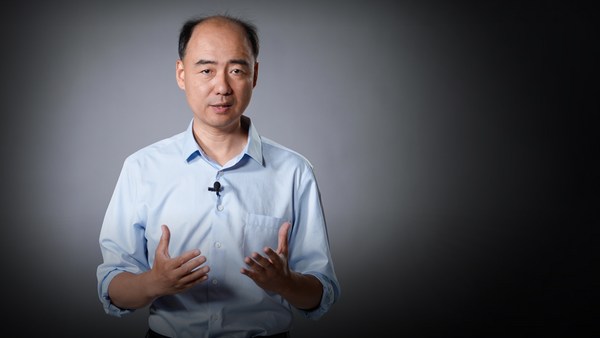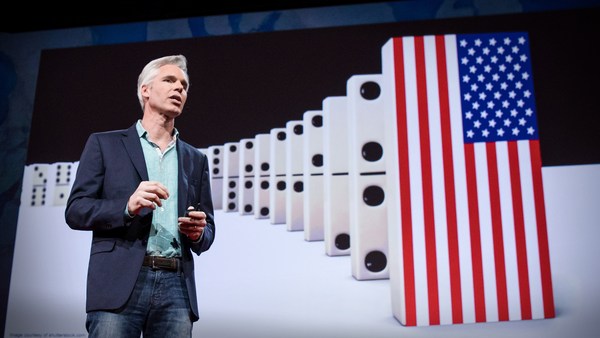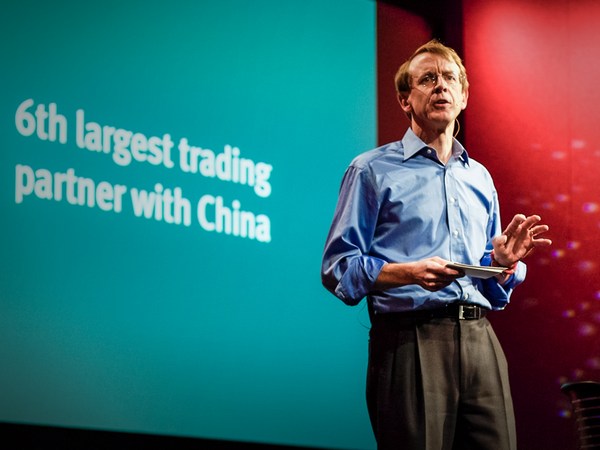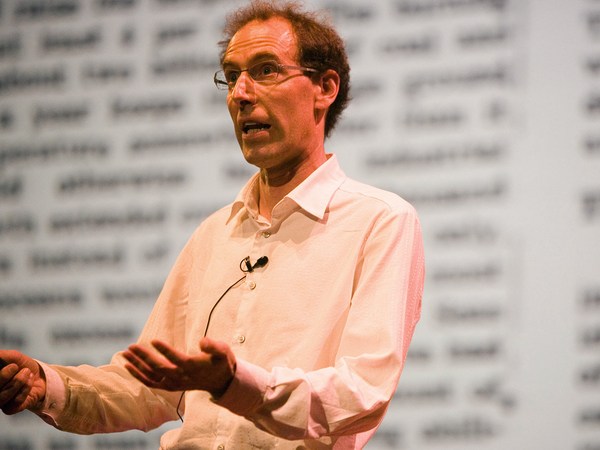Now, when you think of the industries most responsible for climate change, you probably summon up an image of an oil rig, right? Maybe even a coal mine or a megafarm, perhaps heavy engineering. But there’s one industry that’s never mentioned in that list even though every other industry depends upon it. I’m talking about an economic sector that makes ... nothing. It has no stock, no warehouses, no factories. It’s entirely powered by brains, by spreadsheets and by PowerPoint. Who is this mystery industry? The professional services of advertising and PR firms, the big management consultancies, the corporate lawyers and lobbyists. Together, this sector is worth over two trillion dollars a year. Let’s call it the “X industry,” where X is for influence.
Now, when it comes to climate change, each individual firm in this sector has the carbon footprint probably no bigger than your average kindergarten. But the brainprint of the X industry is felt everywhere. And that’s because these problem-solvers and storytellers act as the grease in the wheel of all other businesses on Earth. And that gives the X industry an outsize influence on the likelihood that we reach net-zero, or they will be one of the primary architects of climate destruction.
Now, how? Remember that oil rig we imagined a moment ago? Think about how it’s actually built. I’ve seen this firsthand. It takes a village of X industry advisers to raise a rig. First -- often, the oil exploration proposals are financially modeled by one of the big constultancies. Then the lobbying firms push through regulatory approval, often years, if not decades, ahead of a single drop of oil being pumped. Then the PR agencies, they come in and they work to get local communities onside. And the legal firms squash any legal objection. Finally, the creative agencies craft influence campaigns to help sell the image of the oil industry and to sell the product itself. Oil companies know how to drill for oil, but they’ve outsourced almost everything else to this army of publicists and consultants, to lawyers and to lobbyists.
We all remember the Deepwater Horizon disaster of 2010, when BP polluted the Gulf of Mexico with over four million barrels of oil. What you might not know is that BP admitted to spending three times as much on promotional advertising in the year after the disaster than in the year before. And arguably, the X industry has done a better job of cleaning up BP’s image than BP has yet done cleaning up the Gulf of Mexico.
(Applause)
Thank you.
(Applause)
Oh, come on, come on. Is it really fair for me to hold the X industry responsible for the environmental impact of their clients? There is no official way to do so just yet. We recognize only three scopes of carbon emission. Scopes one and two: all the direct emissions from your fleets and your factories and the power that you purchase. In the UK, the advertising association has estimated that the entire carbon footprint of the UK ad industry, worth over 20 billion dollars a year, is just 1.1 million tonnes. 1.1 million tonnes.
Now, scope three, the third scope, this is a bit harder. This is all the indirect emissions from how people use your products or from your supply chain. And that’s a necessary headache for a lot of companies to start taking control over. But technically, the X industry barely moves the dial here either. That’s why I believe that the X industry needs a new scope X, a way to account for the emissions of influence.
Now the --
(Applause)
The experts at the Purpose Disruptors network have made a start at doing just that. They looked at a single advertising campaign made for Audi. Now this campaign won one of the big effectiveness awards in advertising. And the car company and their advertising agency claimed that this single campaign generated 1.78 billion dollars of incremental revenue for Audi. The ad campaign sold a lot of cars. And if their claim is correct, it also generated 5.1 million tonnes of additional carbon for Audi. So this is a one-to-five ratio between the impact of an entire industry -- the entire ad industry -- versus one single advertising campaign.
It is time for those of us, like me, who work in this industry, to take our responsibility seriously. And that starts with being honest about who pays our bills. The X industry is famously murky about that. And so my firm in 2015 produced the first client disclosure report. It’s very simple. We just disclosed our revenue by the client industries which we serve. I’m so pleased to say that 170 other ad agencies, consultancies and PR companies have now promised to do the same.
(Applause)
But our industry is dominated by a handful of really big consultancies and advertising agencies, and not one of them have yet promised to join us. And this really matters because the X industry is hiring up many of the most inventive, creative, knowledgeable and influential minds that humanity has. And those are the exact same skills that we need to change the course of climate change. Now we need all of that X industry talent to stop serving destruction and start serving solutions. And if you work in the X industry, you’re probably beginning to feel a little bit uncomfortable right now. Good.
(Laughter)
(Applause)
I want you to ask yourself: Are you selling your talent to the right people? Are you serving the causes of climate change or the solutions to it? And are you using all that vaunted ability to influence your clients or just to influence their critics?
This must be the solutions decade, and we’re nearly two years into our window to change our systems towards climate justice, towards clean energy, circular systems, sustainable and equitable lifestyles. This solutions decade desperately requires really good-quality financial modeling. It requires a really strong legal framework, great research. It really needs public support. It needs the right regulatory rules. And it needs creative storytelling, and that’s what my X industry could deliver.
This year, I changed my job title to “Chief Solutionist”. I changed it to constantly remind myself of the job that needs doing. Because as an X industry leader myself, I can either serve the solutions every day, or by default, I’m serving destruction. There is no middle ground here. There must be no carefully worded rationales. And the X industry can no longer pretend it can remain neutral. Now if we do that, perhaps we could become a league of solutionists and shift all of this creativity, inventiveness, knowledge and influence towards fixing climate change. And then this invisible and intangible and incredibly influential X industry can finally stop being part of the problem and become part of the solution.
Thank you.
(Applause and cheers)





